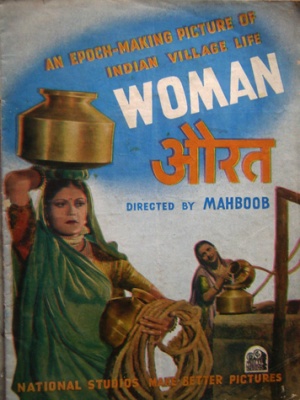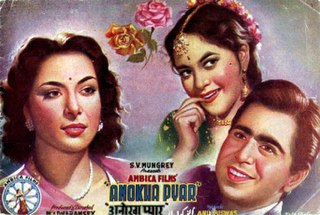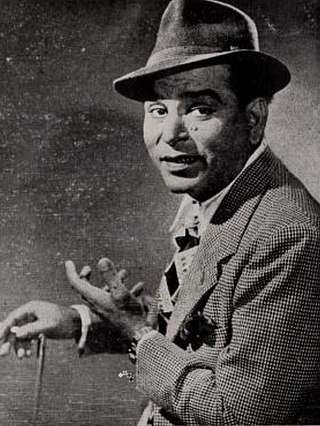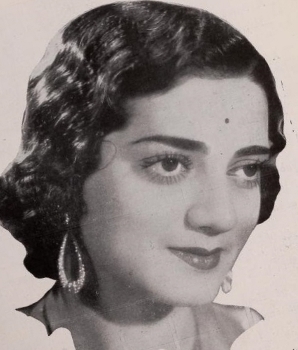Related Research Articles

Anil Krishna Biswas, professionally known as Anil Biswas, was an Indian film music director and playback singer from 1935 to 1965, who apart from being one of pioneers of playback singing, is also credited for the first Indian orchestra of twelve pieces and introducing orchestral music and full-blooded choral effects, into Indian cinema. A master in western symphonic music was known for the Indian classical or folk elements, especially Baul and Bhatiyali in his music. Out of his over 90 films, most memorable were, Roti (1942), Kismet (1943), Anokha Pyar (1948), Tarana (1951), Waaris (1954), Pardesi (1957) and Char Dil Char Rahen (1959).

Aurat, also known by its English title Woman, is a 1940 Indian film directed by Mehboob Khan and starring Sardar Akhtar, Surendra, Yakub, Kanhaiyalal and Arun Kumar Ahuja. The film's music is by Anil Biswas and dialogue is by Wajahat Mirza. Mehboob Khan later remade this film as Mother India (1957), which is considered one of the biggest hits of all time in Indian Cinema.

Anokha Pyar is a 1948 Indian Hindi language film. The film stars Dilip Kumar, Nargis, Nalini Jaywant in lead roles. The black and white romantic love triangle was directed by M. I. Dharamsey under the Ambika Films banner. The music was composed by Anil Biswas, who gave a then unknown young Lata Mangeshkar maximum songs to sing for the film. The rest of the cast included Sankatha Prasad, Mukri, Ved, Kesarbai, Habib and Sheikh.

Yakub Khan, known as Yakub, was an Indian actor born into a Pathan family in Jabalpur, Madhya Pradesh, India. He is best known for his comic and comic villainous roles.
Hum Tum Aur Woh is a 1938 Hindi/Urdu social drama film. The film was directed by Mehboob Khan for Sagar Movietone. The music was composed by Anil Biswas with lyrics by Wajahat Mirza and Zia Sarhadi. The cinematographer was Faredoon Irani. The film starred Motilal, Maya Banerjee, Rose, Yakub and Sankatha Prasad. The film was a romantic triangle involving Moti (Motilal), Bina the girl he's engaged to and Leela (Rose) who is obsessed with him.
Al Hilal is a 1935 Urdu/Hindi costume drama film. It was the debut directorial venture of Mehboob Khan. He went on to become "one of the pioneer directors of Indian Cinema". The film is thought to be inspired by Cecil B. DeMille's The Sign of the Cross. The film was produced by Sagar Movietone. The director of photography was Faredoon Irani. The music composer was Pransukh Nayak with lyrics by Munshi Ehsan Lucknavi. It starred Kumar, Indira, Yakub, Sitara Devi, Kayam Ali and Mehboob Khan. The film depicted fictionalised history in the form of a Roman-Arab conflict, with the son of the Ottoman Empire being captured by the Roman army and his escape from them.

Watan (transl. Homeland) is a 1938 Hindustani costume drama film directed by Mehboob Khan. Produced by Sagar Films, the film had story by Mehboob Khan and Wajahat Mirza. The cinematographer, as for most Sagar films, was Faredoon Irani. Following the successful music of Manmohan (1936), Sagar Movietone retained Anil Biswas as the in-house music director, scoring music for Watan along with other releases of the time from the studio. The cast of the film included Kumar, Bibbo, Maya Banerjee, Yakub Lala, Sitara Devi and Kayam Ali.
Manmohan is a 1936 Indian Urdu/Hindi-language romantic tragedy film directed by Mehboob Khan. This was Khan's third film for Sagar Movietone after Al Hilal (1935) and Deccan Queen (1936). The cinematographer was Faredoon Irani who, starting from Mehboob Khan's Al Hilal (1935), went on to establish a long working relationship with him lasting till Khan's last film Son of India (1962). The music was composed by Ashok Ghosh assisted by Anil Biswas. The story writer was Zia Sarhadi who also wrote the lyrics, screenplay and dialogue in addition to acting in the film. Though he had started his writing career on Khan's backing for Deccan Queen (1936), it was with Manmohan that he achieved success. The film was inspired by Devdas, (1935), which was a big hit at the box office. Surendra was chosen as the singing star to rival K. L. Saigal from New Theatres Calcutta, whose songs from Devdas had mesmerised the nation. Though Manmohan was referred to as the "poor man's Devdas" the film went on to do well and the songs became very popular. The film starred Bibbo, Surendra, Yakub, Kayam Ali, Bhudo Advani and Mehdi Raza.
Deccan Queen is a 1936 Hindustani action-adventure film directed by Mehboob Khan. It was the first "stunt" film from Sagar Movietone and the first film for actor Surendra, who was credited as "Surendra Nath B.A., L.L.B.". The film helped launch him as a singing star. This was the only action film directed by Mehboob Khan as he later shifted to films with social and political slant. This was Mehboob Khan's second directorial venture after Al Hilal (1935). He asked Zia Sarhadi then an unknown small-time actor, to write the screenplay, dialogue and songs for Deccan Queen. The music direction was by Pransukh Nayak along with Ashok Ghosh. The cinematographer was Faredoon Irani. The film starred Surendra, Aruna Devi, Ramchandra Pal and Kayam Ali.

Alibaba is a 1940 Urdu/Hindi fantasy film directed by Mehboob Khan for Sagar Movietone. The music was directed by Anil Biswas, with lyrics by Safdar Aah. The film was a bilingual, made in Punjabi language as Alibaba at the same time. It starred Surendra, Sardar Akhtar, Ghulam Mohammed and Wahidan Bai.

Teen Sau Din Ke Baad is a 1938 Hindi social comedy film directed by Sarvottam Badami. This was Badami's first comedy film and it was a success at the box-office; he went on to direct two more comedies after this, Aap Ki Marzi (1939) and Ladies Only (1939), also successes. The film was produced by Sagar Movietone, with story written by Babubhai A. Mehta and dialogue by Wajahat Mirza and Waqif. The music was composed by Anil Biswas with lyrics by Zia Sarhadi. The director of photography was Faredoon Irani and the film starred Bibbo, Motilal, Sabita Devi, Yakub, Pesi Patel and Gulzar.
Grama Kanya is a 1936 Hindi melodrama film directed by Sarvottam Badami. The film produced by Sagar Movietone had cinematography by Faredoon Irani, story by Jayant Shyam and dialogue by Waqif. The music was composed by the renowned bhajan singer Shankarrao Khatu. The cast included Surendra, Sabita Devi, Yakub, Aruna, Kayam Ali, and Gulzar.
Jeevan Lata is a 1936 Hindi social drama film directed by Sarvottam Badami. The film was produced by Sagar Movietone and had music by Pransukh M. Nayak. Sabita Devi and Motilal paired in several films right from Motilal's first Shaher Ka Jadoo (1934), with Badami using the pair for many of the films he directed for Sagar Movietone. This was Motilal's fourth film. The film starred Sabita Devi, Motilal, Gulzar, Sankatha Prasad, Bhudo Advani and Mehdi Raza.
Kokila (transl. Nightingale) is a 1937 Hindi social family drama film directed by Sarvottam Badami. The music was composed by Anil Biswas with lyrics written by Siddiqui and Zia Sarhadi. The story was adapted from the well-known novel Kokila, written by Gujarati writer Ramanlal Vasantlal Desai. The film starred Motilal, Sabita Devi, Shobhna Samarth, Maya Bannerjee, Sitara Devi, Pesi Patel, Siddiqui and Kayam Ali.
Ladies Only is a 1939 Indian Hindi-language social comedy film directed by Sarvottam Badami. Produced by Sagar Movietone, it had music by Anupam Ghatak and starred Surendranath, Sabita Devi, Bibbo and Prabha. This was the last comedy film made by Sarvottam Badami before he left Sagar Movietone. He joined his mentor Ambalal Patel, at Sudama Pictures to start making "socially relevant" films.

Surendra was an Indian singer-actor of Hindi films. Known by his mononym, Surendra was born and educated in Punjab to be a lawyer by profession. He came to Bombay to become a singer on the recommendation of a Delhi distributor and his friends. He was "picked" by Mehboob Khan whom he met at Sagar Movietone, to sing and act in films as an alternative to the then Calcutta-based singer-actor, K. L. Saigal. Surendra started his career with his debut starring role in Deccan Queen (1936), directed by Mehboob Khan. He soon became a part of Sagar Movietone when his song "Birha Ki Aag Lagi More Man Mein" from the film became an "instant hit".

Bibbo was a music composer, singer and actress who worked in both Indian and Pakistani films. She acted in Indian cinema from 1931 to 1947 before moving to Pakistan, following Partition of India in 1947. She started her acting career with Ajanta Cinetone Ltd. in 1933, working with directors like M. D. Bhavnani and A. P. Kapoor. She was one of the top leading ladies of the 1930s along with actresses like Devika Rani, Durga Khote, Sulochana, Mehtab, Shanta Apte, Sabita Devi, Leela Desai and Naseem Banu. She was referred to as "one of the most important female stars of the 1930s and 1940s". Her fame had her featured in the lyrics of a popular song from the film Gharib Ke Lal (1939) sung by Mirza Musharraf and Kamla Karnataki, with music by Sagheer Asif and lyrics by Rafi Kashmiri. "Tujhe Bibbo Kahoon Ke Sulochana", where Sulochana referred to another popular actress of the time. This was the first time a song featuring famous actors was used in the lyrics of a film song.

Sabita Devi (1914–1965) was a Hindi film actress in Indian cinema. She is stated to be one of the "prominent" leading ladies of the "pioneering era" of Indian cinema along with Mehtab, Bibbo, Durga Khote, Gohar, Devika Rani and Seeta Devi. A Jewish by birth, she changed her name to find acceptability in Hindi cinema like the other Anglo-Indian and Jewish actresses of her time, Sulochana, Seeta Devi, Madhuri, and Manorama. After initially working with British Dominion Films Ltd., Calcutta, she shifted to Bombay and performed mainly in films produced by Sagar Movietone with her co-star in most films being Motilal. Some of the popular films with Motilal were Dr. Madhurika (1935) and Kulvadhu (1937) directed by Sarvottam Badami. Their first film together was Shaher Ka Jadoo (1934), which was also Motilal's debut film, and then Lagna Bandhan (1936) both directed by Kaliprasad Ghosh. She acted in Silver King (1935) with Motilal. It was an action film directed by C. M. Luhar, which became a "huge success".

Sagar Movietone also Sagar Films, Sagar Film Company and Sagar Productions was an Indian film production company involved in the making of films for Indian cinema. It was launched by Ardeshir Irani with Chimanlal Desai and Dr. Ambalal Patel in 1929 in Bombay, Maharashtra, India. Sagar was initially started as a branch company of Ardeshir's Imperial Film Company. Several key figures from Imperial, such as Mehboob Khan were shifted to Sagar. The studio was in operation from 1930 to 1939. In 1940, it combined with General Pictures to form National Studios. It made "Parsi theatre based films, mythologicals and stunt movies". Sagar fostered the career of many artists who rose to prominence. Early directors such as Prafulla Ghosh, Sarvottam Badami, Ezra Mir and Nanubhai Vakil were promoted by the company. Mehboob Khan got his first break as a director in Al Hilal in 1935. He was referred to as "the most important alumnus" from Sagar, who went on to become one of Indian cinema's "most influential film-makers".

Bhudo Advani was an Indian character actor and comedian. He started his acting career in theatre with the notion of spreading awareness on social issues. He came to Bombay on the advice of an Ajanta Cinetone representative and was offered a role in the film Afzal, also called Hoor-E-Haram in 1933, directed by Mohan Bhavnani. He later joined Sagar Movietone, becoming an important fixture in most films produced by them. He turned from character roles to comedy performing in Dr. Madhurika (1935), directed by Sarvottam Badami, Deccan Queen (1936) and Do Diwaane (1936), by C. Luhar.
References
- ↑ Crow, Jonathan (2014). "Jagirdar 1937 Overview". Movies & TV Dept. The New York Times . Baseline & All Movie Guide. Archived from the original on 8 September 2014. Retrieved 8 September 2014.
- ↑ "Jagirdar 1937". citwf.com. Alan Goble. Retrieved 8 September 2014.
- ↑ Ahmed, Rauf (2008). Mehboob Khan The Legends of Indian Cinema Series. Delhi, India: Wisdom Tree. p. 31. ISBN 9788183281065.
- ↑ Likhi, Abhilaksh. "The master of melodrama". tribuneindia.com. The Tribune. Retrieved 8 September 2014.
- ↑ Raheja, Dinesh (3 May 2013). "Bollywood turns 100: the trend setters". HT Media Limited. Hindustan Times, Mumbai. Archived from the original on 4 May 2013. Retrieved 8 September 2014.
- ↑ Rajadhyaksha, Willemen, Ashish, Paul (2014). Encyclopedia of Indian Cinema (2, revised ed.). Routledge. p. 272. ISBN 9781135943189.
{{cite book}}: CS1 maint: multiple names: authors list (link) - ↑ "Jagirdar 1937". upperstall.com. The Rest. Retrieved 8 September 2014.
- ↑ "Jagirdar 1937". muvyz.com. Muvyz, Inc. Retrieved 8 September 2014.